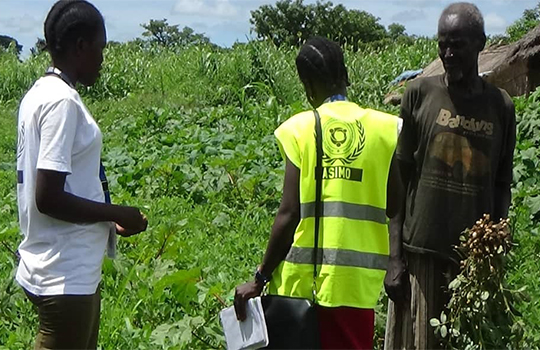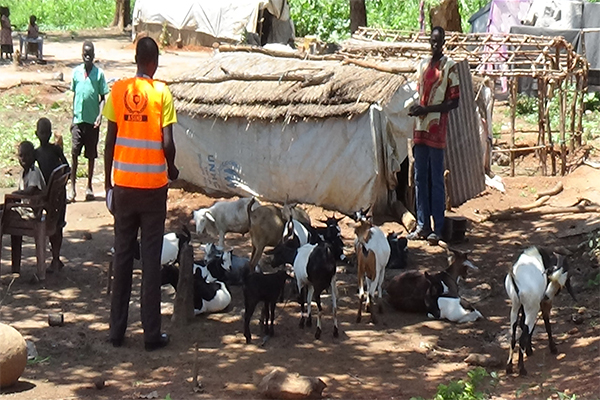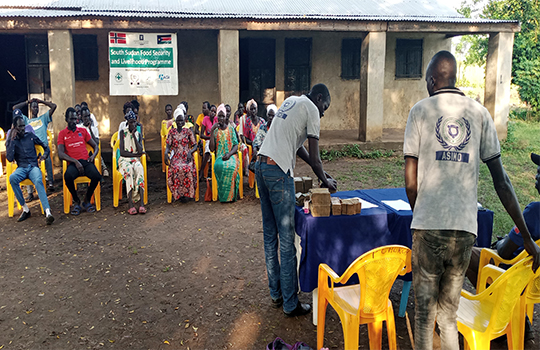Food Security & Livelihood (FSL)
The high levels of acute food insecurity in South Sudan remain worrying, with the most severely acute food insecure populations significantly affected by frequent climate-related shocks (flooding and dry spells), the economic crisis (currency depreciation and high food prices), conflict and insecurity – including the spill over effects of the conflict in Sudan – causing forced displacement, low agricultural production and a reduction in humanitarian assistance. According to a WFP report 2023, there are currently 2.2 million people displaced in the country and 2.3 million South Sudanese refugees in neighbouring countries. The multiplying shocks have made it impossible for smallholder farmers in 10 States and 3 administrative areas to grow enough food to support themselves or their communities. Additionally, with a heavy reliance on imports, many people across South Sudan are unable to afford basic food items and must rely on humanitarian assistance.
Women and girls suffer disproportionately from hunger and food insecurity. Cultural norms and decades of violence – including rape as a weapon of war – underpin deep gender inequalities. Cycles of poverty, gender inequality and food insecurity are likely to continue. A total of 2.8 million children are out of school, more than half of whom are girls. There is a 29 percent literacy rate for women compared to 40 percent for men – one of the lowest female rates in the world.
Cultivation is characterized by slash-and-burn rotational practices, and the use of rudimentary tools and traditional planting materials. Production is rain fed and subsistence oriented. Poor production methods limit households to cultivating an average of 2 to 4 feddans and yields are often quite low. Productivity is constrained by a lack of access to adequate and improved inputs, poor farming practices, crop pests and diseases, and limited availability of labour. The main crop disease is the cassava mosaic virus (CMV) and its East African variant. There is a serious risk of the extremely virulent Ugandan variant spreading to South Sudan as cross-border population movements continue. Pest infestations, mainly of striga, are also a cause for concern.
Livestock play an important role in the livelihoods of agro-pastoralists groups, contributing significantly to household food and income. Large numbers of people migrate seasonally in search of pasture and water for their animals. However, livestock production is restricted by inadequate veterinary extension services to control livestock diseases and improve animal husbandry practices, insecurity in the form of cattle raiding and weak livestock marketing infrastructure. Additionally, the subsector’s full potential is not realized due to disease outbreaks, chronic drought, insecurity, limited infrastructure, and poorly organized and informed herders. Many of these problems arise from a lack of capacity and resources to implement policies governing animal production, marketing, trade and veterinary public health, and the absence of reliable data to prioritize sector development interventions. There is, therefore, a need for a careful cost-benefit analysis of disease control options and a sound implementation strategy for such interventions. Fishing communities along the Nile River networks face many challenges, including weak or non-existent infrastructure, such as roads, which makes access to markets difficult to sell produce or buy fishing gear. The fisheries subsector experiences considerable losses linked to a lack of processing skills and materials, and limited access to markets and storage infrastructure. Massive investment in fisheries would contribute significantly to poverty reduction, improved nutrition and sustainable growth in the region.
To address these gaps, ASIMO will continue building community resilience through timely and resilient food security measures, sustainable livelihoods, and strategies designed to help internally displaced persons, vulnerable host communities, returnees, and refugees in South Sudan.
The organization will continue intervening in the agriculture sector by supporting the (i) Professionalization of producer organizations (POs) and accordingly entrepreneurial capacities, particularly of women and youth through the enhancement of their bargaining power and representativeness;(ii) Creation of innovative and sustainable economic partnerships, in particular with private businesses for the supply of climate resilient inputs, processing, packaging and marketing techniques; and

Visit to a farm by ASIMO team.
(iii) Strengthened and more customized financing capacities of smallholder farmers , (iv) Village savings and loan associations VSLAs, cooperatives, MSEs and expand linkages with profitable market opportunities and financial institutions in South Sudan.
ASIMO’s projects have been supporting the States Ministry of Animal Resources in South Sudan to cater for identified gaps. Such support has been accompanied by relevant training to the state animal health department veterinary staff and other officials on disease control, drugs storage and distribution, training of community animal health workers as well as establishing good communication between government and animal health workers at village level for purposes of disease surveillance.
De-worming campaigns are organized locally and jointly with community animal providers and the State Ministry of Animal Resources. We shall continue with a joint campaign with State Ministry of Animal Resources and Fisheries (SMARF) to allow animals to better cope with recurrent harsh periods and guarantee a better market value for households.

Livestocks vaccination carried out by ASIMO Team.
The prevailing negative social norms and practices have historically hindered the progress of women, youth and young girls in South Sudan, and they are currently undergoing challenges due to prolonged conflict, economic insecurity and climate change as well as inadequate opportunities for empowerment.
In a country where four in five people endure extreme poverty and 70% need humanitarian assistance, women and girls bear the brunt of depravation, shouldering disproportionate responsibility as caregivers, breadwinners, and protectors for families and communities that have been ravaged by conflict, submerged by floods, and battered by repeated natural and human-made disasters.
Additionally, South Sudan is characterized by high youth unemployment, which exceeds 30%, with 31.9% for men and boys, and 27.1% for women and girls. ASIMO will continue with its commitment and interventions to support women, youth and girls and to foster peace and sustainable development in South Sudan at a time when the country faces a fragile window for change as it seeks to consolidate the gains of a 2018 peace agreement and overcome the lingering challenges of persistent violence and a chronic humanitarian crisis.
To address these gaps, ASIMO will expand its support for youth, women and young girls in South Sudan by ensuring that the entrepreneurs/ MSEs, cooperatives and village saving and loan associations (VSLAs) and small holder farmers are supported building the capacities on business skills management, entrepreneurship, financial literacy and start-up grants as well as linking them with markets and financial institutions to directly benefit and sustain their household incomes and create jobs opportunities by their own. This will present an opportunity for young entrepreneurs both women and youth to participate in and benefit from the national socio-economic recovery & development process.

